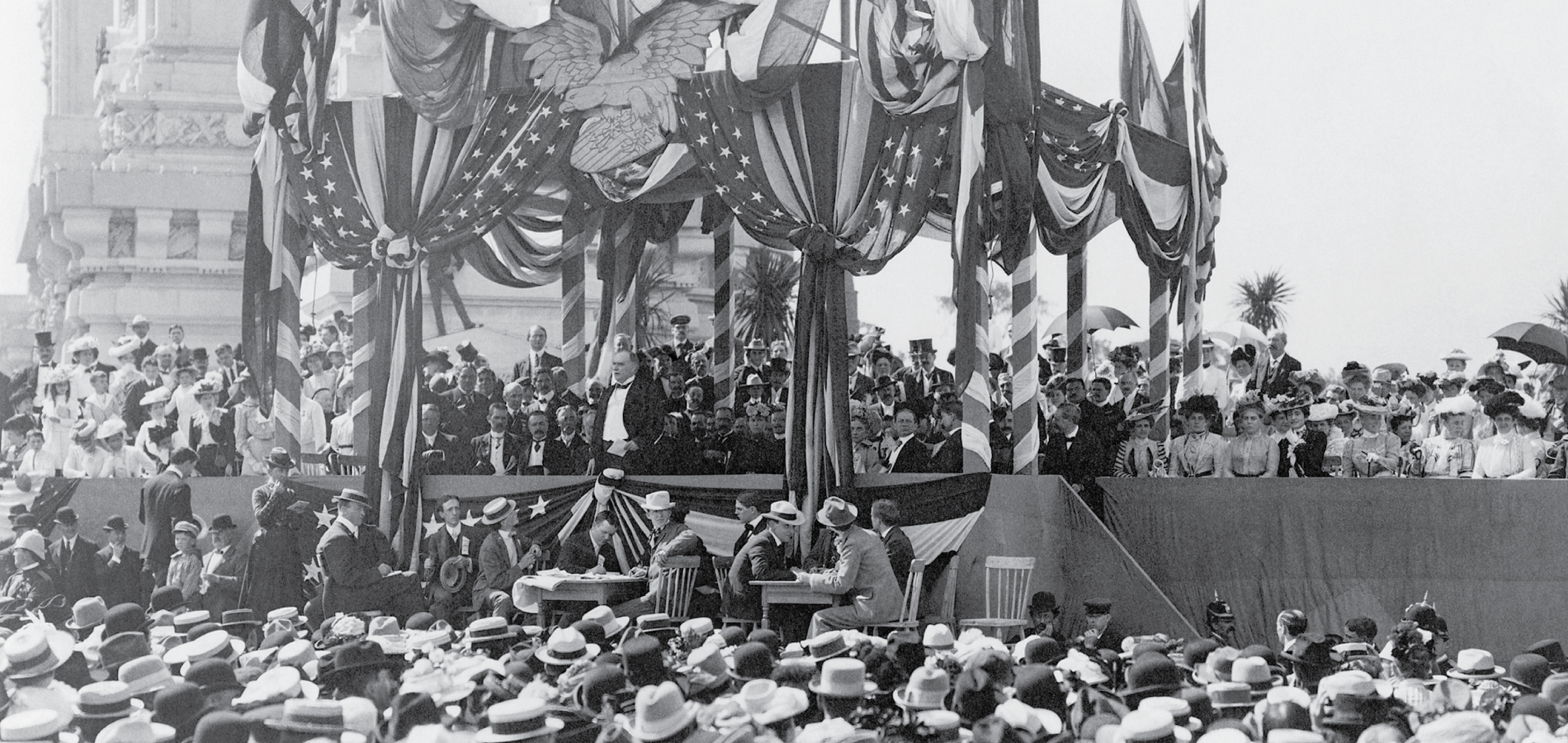Featured image: “Lincoln vs Douglas Debate Memorial – Washington Park Historic District-Ottawa Illinois” by JabSVBS13, licensed under CC BY-SA 4.0.
Today, publicized debates between political opponents are commonplace. They’re televised on the news, streamed on social media, and within minutes are often boiled down into bite-sized pull quotes, hashtags, and memes. Many of us don’t even need to watch the debates in order to learn what happened before the night is over.
However, in the 1800s, this was not the case. Transportation via horse was not conducive to relaying information quickly to newspapers and then to the public. But with the inventions of the railroad and the telegraph, the time was ripe for political debates to receive nationwide attention—and with the issue of slavery at the forefront, the Lincoln-Douglas debates became public attractions that drew crowds of thousands of people and helped shape politics for decades to come.
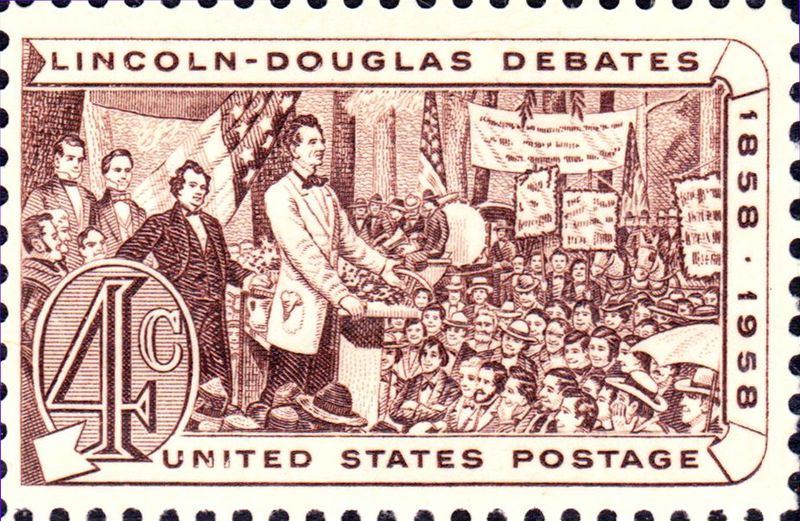
Setting the Scene
As America expanded its borders west, the country was divided in terms of whether slavery should be allowed in these new territories. After the Louisiana Purchase added nearly 830,000 square miles of land to the budding nation, Congress passed the Missouri Compromise[1]To authorize the people of the Missouri territory to form a Constitution and state government, and for the admission of such State into the Union on an equal footing with the original States, and to prohibit slavery in certain territories., Chapter … Continue reading in 1820, which allowed Maine to be a free state and outlawed slavery north of latitude 36°30′,[2]“Senate Journal, 16th Congress, 1st Session.” U.S. Congressional Serial Set, , 1819, pp. 1-498. HeinOnline, https://heinonline.org/HOL/P?h=hein.usccsset/usconset49622&i=204. This document can be found in … Continue reading except for Missouri. After the Mexican-American War added even more land, Congress enacted the Compromise of 1850,[3]For the admission of the State of California into the Union., Chapter 50, 31 Congress, Public Law 31-50. 9 Stat. 452 (1850). This document can be found in HeinOnline’s U.S. Statutes at Large database. which established that California would be admitted as a free state, the size of Texas—a slave state—would be decreased, and Utah and New Mexico would decide upon slavery based upon the notion of popular sovereignty,[4]“Motion for adjustment of questions of slavery, etc., in territories acquired from Mexico, and of boundary of Texas, 3 pts.” U.S. Congressional Serial Set, , 1849, pp. 1-2. HeinOnline, … Continue reading or local vote.
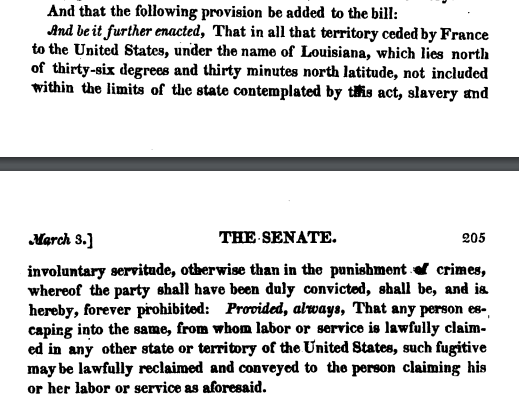
However, in 1854, Stephen A. Douglas, Democratic senator from Illinois, proposed the Kansas-Nebraska Act,[5]To organize the Territories of Nebraska and Kansas., Chapter 59, 33 Congress, Public Law 33-59. 10 Stat. 277 (1854). This document can be found in HeinOnline’s U.S. Statutes at Large database. stating that popular sovereignty should be used to determine legality of slavery in Kansas and Nebraska,[6]Organic Acts for the Territories of the United States with Notes Thereon, Compiled from Statutes at Large of the United States. Washington, D.C., U.S. G.P.O. HeinOnline, https://heinonline.org/HOL/P?h=hein.prestate/oartterr0001&i=119. This … Continue reading both of which were farther north than the latitude 36°30′ border established by the Missouri Compromise, effectively repealing it. While pleasing Democrats, this infuriated abolitionists and led to the creation of the Republican Party, as well as near civil war in Kansas, where pro- and anti-slavery activists engaged in deadly uprisings referred to as “Bleeding Kansas.”[7]“Commemoration of historical events in Kansas.” U.S. Congressional Serial Set, , 1965, pp. 1-8. HeinOnline, https://heinonline.org/HOL/P?h=hein.usccsset/usconset22128&i=909. This document can be found in … Continue reading
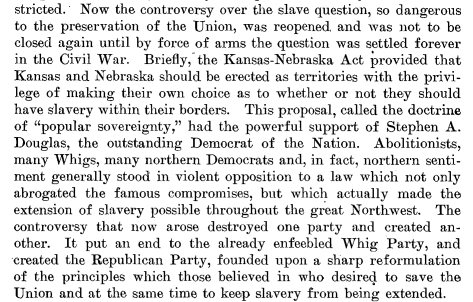
Three years later, in 1857, the Supreme Court decided in Dred Scott v. Sanford[8]Dred Scott, Plaintiff in Error, v. John F. A. Sandford, 60 U.S. 393, 634 (1856). This document can be found in HeinOnline’s U.S. Supreme Court Library. that Black people, whether enslaved or free, could not become U.S. citizens and that neither Congress nor any territorial legislature had the power to exclude slavery from new territories.
A Hotly Contested Election
The Illinois senatorial election of 1858 found Democratic Senator Stephen A. Douglas running for a third term against Republican challenger Abraham Lincoln. As a Democrat, Douglas supported slavery and was a proponent of popular sovereignty.[9]“Report of Benjamin Harrison Memorial Commission.” U.S. Congressional Serial Set, , 1941, pp. 1-344. HeinOnline, https://heinonline.org/HOL/P?h=hein.usccsset/usconset23135&i=85. This document can be found in … Continue reading Meanwhile, Lincoln was staunchly anti-slavery, and during his term in the House of Representatives from 1846 to 1848 had supported the Wilmot Proviso,[10]“Annual report of American Historical Association, 1891.” U.S. Congressional Serial Set, , 1891, pp. I-500. HeinOnline, https://heinonline.org/HOL/P?h=hein.usccsset/usconset33246&i=765. This document can be found in … Continue reading which would have banned slavery in any new territory. In a now famous speech,[11]Political Debates between Abraham Lincoln and Stephen A. Douglas in the Celebrated Campaign of 1858 in Illinois (1895). This document is located in HeinOnline’s U.S. Presidential Library. Lincoln stated that, “A house divided against itself cannot stand,” and “I believe this government cannot endure permanently half slave and half free.”
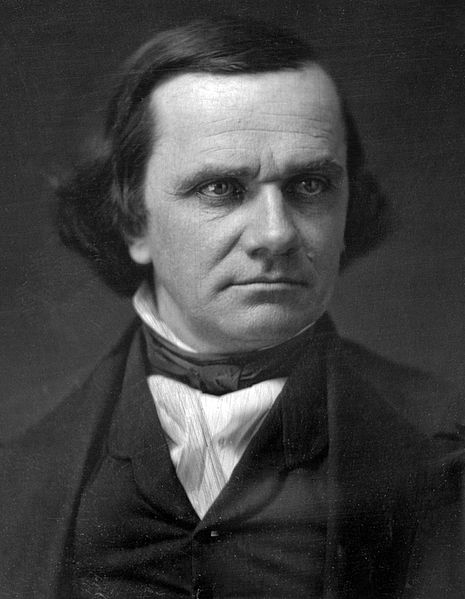
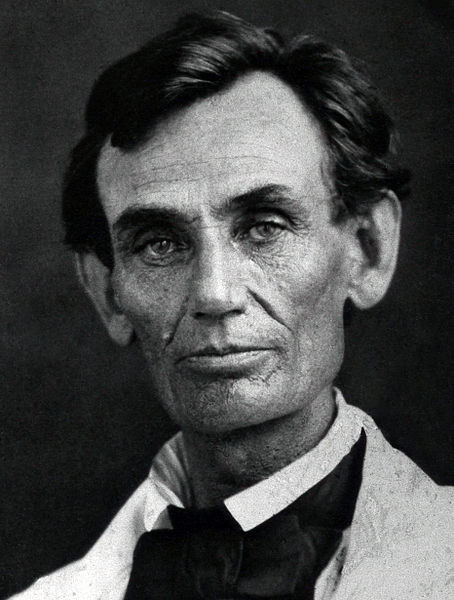
As part of their campaigns, Douglas and Lincoln decided to hold a series of seven debates,[12]“The Senate, 1789-1989, addresses on history of U.S. Senate.” Congressional Serial Set, , 1987, pp. i-788. HeinOnline, https://heinonline.org/HOL/P?h=hein.usccsset/usconset51399&i=405. This document can be found in … Continue reading each to be held in a different congressional district. The main topic of debate was slavery.
Lincoln vs. Douglas
Each debate was a whopping three hours long.[13]Harry V. Jaffa. Crisis of the House Divided: An Interpretation of the Issues in the Lincoln-Douglas Debates (1959). This document is located in HeinOnline’s U.S. Presidential Library. It began with a one-hour opening address—Douglas and Lincoln would alternate who went first, but as Douglas was the incumbent, he opened four times. Then, the opponent would respond to the opening for one and a half hours. Finally, the opening candidate received a 30-minute rebuttal.
The debate schedule was as follows:
- August 21: Ottawa
- August 27: Freeport
- September 15: Jonesboro
- September 18: Charleston
- October 7: Galesburg
- October 13: Quincy
- October 15: Alton
Throughout the debates, Douglas would repeatedly accuse Lincoln of being an abolitionist and wanting racial equality. Lincoln, however, still believed in white supremacy[14]“Denial of elective franchise in Mississippi at elections of 1875 and 1876.” U.S. Congressional Serial Set, , 1876, pp. I-1008. HeinOnline, https://heinonline.org/HOL/P?h=hein.usccsset/usconset23575&i=704. This … Continue reading—he simply believed that, as humans, Black people had a right to liberty, but that they should still be inferior to whites and should not be allowed to vote or become citizens.

At the Freeport debate,[15]“The Senate, 1789-1989, addresses on history of U.S. Senate.” Congressional Serial Set, , 1987, pp. i-788. HeinOnline, https://heinonline.org/HOL/P?h=hein.usccsset/usconset51399&i=405. This document can be found in … Continue reading Lincoln asked Douglas to reconcile the Dred Scott decision and his Kansas-Nebraska Act, and Douglas replied with what would become known as the Freeport Doctrine: that new territories that didn’t want slavery could simply not instate the police enforcement needed to protect slaveowner rights.[16]“The Senate, 1789-1989, addresses on history of U.S. Senate.” Congressional Serial Set, , 1987, pp. i-788. HeinOnline, https://heinonline.org/HOL/P?h=hein.usccsset/usconset51399&i=409. This document can be found in … Continue reading This policy would cause a permanent divide in the Democratic party—Northerners favored it, while Southerners wanted slavery to be legal in all new territories.
With the rising use of railroads, these debates were attended by crowds of thousands of people.[17]Harry V. Jaffa. Crisis of the House Divided: An Interpretation of the Issues in the Lincoln-Douglas Debates (1959). This document is located in HeinOnline’s U.S. Presidential Library. And for those who couldn’t make it, electrical telegraphs, as well as Pitman shorthand, meant that reporters could write, publish, and distribute information to the public in a much shorter timeframe than ever before. Of course, many of these articles were heavily biased based on the political leanings of the newspaper.
Impact of the Debates
At the time, senators were chosen by a state’s electorates, so although Lincoln won the popular vote for the senatorial seat, Douglas won the electoral vote. However, the divide between Northern and Southern Democrats would only grow wider, and they would each elect a different candidate for the presidential election of 1860—Northerners chose Douglas, while Southerners selected John C. Breckinridge.[18]“The Senate, 1789-1989, addresses on history of U.S. Senate.” Congressional Serial Set, , 1987, pp. i-800. HeinOnline, https://heinonline.org/HOL/P?h=hein.usccsset/usconset51397&i=233. This document can be found in … Continue reading This meant that Lincoln, who ran for the much more unified Republican Party, was able to win by a wide margin, setting the stage for the Civil War and abolition.
Help Us Complete the Project
Secrets of the Serial Set is an exciting and informative blog series from HeinOnline dedicated to unveiling the wealth of American history found in the United States Congressional Serial Set. Documents from additional HeinOnline databases have been incorporated to supplement research materials for non-U.S. related events discussed.
These posts have been so informative; they enable both patrons and staff to understand what the Serial Set is and how invaluable it is to all kinds of research.
The U.S. Congressional Serial Set is considered an essential publication for studying American history. Spanning more than two centuries with more than 17,000 bound volumes, the records in this series include House and Senate documents, House and Senate reports, and much more. The Serial Set began publication in 1817 with the 15th Congress, 1st session. U.S. congressional documents prior to 1817 are published as the American State Papers.
The Serial Set is an ongoing project in HeinOnline, with the goal of adding approximately four million pages each year until the archive is completed. To date, we’ve completed 95% of the project! View the current status of HeinOnline’s Serial Set project below.
If your library holds all or part of the Serial Set, and you are willing to assist us, please contact Shannon Hein at 716-882-2600 or shein@wshein.com. HeinOnline would like to give special thanks to the following libraries for their generous contributions which have resulted in the steady growth of HeinOnline’s U.S. Congressional Serial Set.
- Buffalo & Erie County Public Library
- University at Buffalo
- Villanova Law Library
- Wayne State University
- University of Utah
- UC Hastings
- University of Montana
- Law Library of Louisiana
- George Washington University
- University of Delaware
- Southern Illinois University, Morris Library
- University of Wisconsin Oshkosh
We will continue to need help from the library community to complete this project. For a complete list of remaining missing volumes of the Serial Set, please email our Marketing Team at marketing@wshein.com.
Continue Your Research with our Slavery in America and the World Database
Researchers can continue to learn about the history of slavery in America and the world with our award-winning Slavery in America and the World: History, Culture and Law collection. Discover a multitude of essential legal and historical materials relating to the institution of slavery. This database is available for free and is included within our complimentary Social Justice Suite.
HeinOnline Sources[+]
| ↑1 | To authorize the people of the Missouri territory to form a Constitution and state government, and for the admission of such State into the Union on an equal footing with the original States, and to prohibit slavery in certain territories., Chapter 22, 16 Congress, Public Law 16-22. 3 Stat. 545 (1820). This document can be found in HeinOnline’s U.S. Statutes at Large database. |
|---|---|
| ↑2 | “Senate Journal, 16th Congress, 1st Session.” U.S. Congressional Serial Set, , 1819, pp. 1-498. HeinOnline, https://heinonline.org/HOL/P?h=hein.usccsset/usconset49622&i=204. This document can be found in HeinOnline’s U.S. Congressional Serial Set. |
| ↑3 | For the admission of the State of California into the Union., Chapter 50, 31 Congress, Public Law 31-50. 9 Stat. 452 (1850). This document can be found in HeinOnline’s U.S. Statutes at Large database. |
| ↑4 | “Motion for adjustment of questions of slavery, etc., in territories acquired from Mexico, and of boundary of Texas, 3 pts.” U.S. Congressional Serial Set, , 1849, pp. 1-2. HeinOnline, https://heinonline.org/HOL/P?h=hein.usccsset/usconset37427&i=283. This document can be found in HeinOnline’s U.S. Congressional Serial Set. |
| ↑5 | To organize the Territories of Nebraska and Kansas., Chapter 59, 33 Congress, Public Law 33-59. 10 Stat. 277 (1854). This document can be found in HeinOnline’s U.S. Statutes at Large database. |
| ↑6 | Organic Acts for the Territories of the United States with Notes Thereon, Compiled from Statutes at Large of the United States. Washington, D.C., U.S. G.P.O. HeinOnline, https://heinonline.org/HOL/P?h=hein.prestate/oartterr0001&i=119. This document can be found in HeinOnline’s U.S. Congressional Serial Set. |
| ↑7 | “Commemoration of historical events in Kansas.” U.S. Congressional Serial Set, , 1965, pp. 1-8. HeinOnline, https://heinonline.org/HOL/P?h=hein.usccsset/usconset22128&i=909. This document can be found in HeinOnline’s U.S. Congressional Serial Set. |
| ↑8 | Dred Scott, Plaintiff in Error, v. John F. A. Sandford, 60 U.S. 393, 634 (1856). This document can be found in HeinOnline’s U.S. Supreme Court Library. |
| ↑9 | “Report of Benjamin Harrison Memorial Commission.” U.S. Congressional Serial Set, , 1941, pp. 1-344. HeinOnline, https://heinonline.org/HOL/P?h=hein.usccsset/usconset23135&i=85. This document can be found in HeinOnline’s U.S. Congressional Serial Set. |
| ↑10 | “Annual report of American Historical Association, 1891.” U.S. Congressional Serial Set, , 1891, pp. I-500. HeinOnline, https://heinonline.org/HOL/P?h=hein.usccsset/usconset33246&i=765. This document can be found in HeinOnline’s U.S. Congressional Serial Set. |
| ↑11 | Political Debates between Abraham Lincoln and Stephen A. Douglas in the Celebrated Campaign of 1858 in Illinois (1895). This document is located in HeinOnline’s U.S. Presidential Library. |
| ↑12, ↑15 | “The Senate, 1789-1989, addresses on history of U.S. Senate.” Congressional Serial Set, , 1987, pp. i-788. HeinOnline, https://heinonline.org/HOL/P?h=hein.usccsset/usconset51399&i=405. This document can be found in HeinOnline’s U.S. Congressional Serial Set. |
| ↑13, ↑17 | Harry V. Jaffa. Crisis of the House Divided: An Interpretation of the Issues in the Lincoln-Douglas Debates (1959). This document is located in HeinOnline’s U.S. Presidential Library. |
| ↑14 | “Denial of elective franchise in Mississippi at elections of 1875 and 1876.” U.S. Congressional Serial Set, , 1876, pp. I-1008. HeinOnline, https://heinonline.org/HOL/P?h=hein.usccsset/usconset23575&i=704. This document can be found in HeinOnline’s U.S. Congressional Serial Set. |
| ↑16 | “The Senate, 1789-1989, addresses on history of U.S. Senate.” Congressional Serial Set, , 1987, pp. i-788. HeinOnline, https://heinonline.org/HOL/P?h=hein.usccsset/usconset51399&i=409. This document can be found in HeinOnline’s U.S. Congressional Serial Set. |
| ↑18 | “The Senate, 1789-1989, addresses on history of U.S. Senate.” Congressional Serial Set, , 1987, pp. i-800. HeinOnline, https://heinonline.org/HOL/P?h=hein.usccsset/usconset51397&i=233. This document can be found in HeinOnline’s U.S. Congressional Serial Set. |


